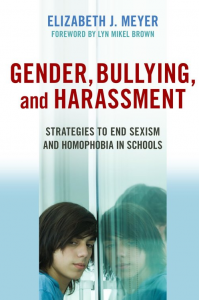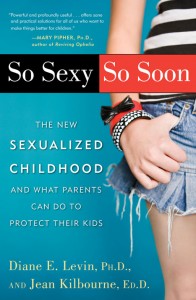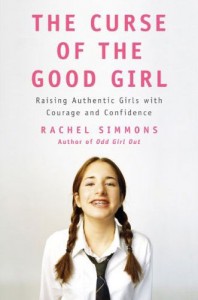|
|
August 16, 2010
 "Gender, Bullying, and Harassment: Strategies to End Sexism and Homophobia in Schools" by Dr. Elizabeth J. Meyer, Ph.D. My guest today on Family Confidential is Dr. Elizabeth J. Meyer, author of Gender, Bullying, and Harassment: Strategies to End Sexism and Homophobia in Schools.
Dr. Meyer, is an Assistant Professor in the Department of Education at Concordia University in Montreal. A former high school teacher and coach, Dr. Meyer knows first hand what it’s like for students who’ve been targeted by other students. From her first days as a teacher fresh out of college, she empowered individual kids to deal with the fear, frustration, and isolation, until it dawned on her that real change can only come when a school’s culture changes.
While there have been countless studies of bullying and harassment in schools, none have examined the key gender issues related to these anti-social behaviors. In her book, Dr. Meyer does just that and offers readers tangible and flexible suggestions to help them positively transform the culture of their school and reduce the incidences of gendered harassment.
If you’ve got kids in school, you won’t want to miss my interview with Elizabeth Meyer. Listen right here:
[QUICKTIME http://www.anniefox.com/podcast/FC018.m4a 300 300 false true]
If you have iTunes, you can subscribe to this podcast in the iTunes Store.
Or, you can download an MP3 version here.
Upcoming guests include:
Dr. Leah Klungness and Rachel Sarah co-founders of SingleMommyhood.com. Dr. Leah is the co-author of The Complete Single Mother. Rachel is the author of Single Mom Seeking: Playdates, Blind dates, and Other Dispatches from the Dating World.
David McQueen, international speaker empowering adults and youth alike on subjects such as leadership, careers and communication skills.
Dr. Karyn Purvis, co-author (with Dr. David Cross, Wendy Lyons Sunshine) of The Connected Child: Bring hope and healing to your adoptive family
Judith Warner author of Perfect Madness: Motherhood in the Age of Anxiety and We’ve Got Issues: Children and Parents in the Age of Medication

January 17, 2010
 “So Sexy So Soon: The New Sexualized Childhood and How Parents Can Protect Their Kids” by Diane E Levin, Ph.D. Little girls have dreamed of being princesses as long as there have been fairy tales. Thanks to Hans Christian Anderson, I myself had a slightly off-kilter fantasy of growing up to be a mermaid. But if I wanted to dress up as a mermaid for Halloween or to paddle around in my friend’s plastic pool I needed to create my own tail, so to speak. Like all former kids who are now today’s parents, my fantasies came directly from my own imagination… evolving naturally from my interests and taking me into realms I chose to explore through play.
But for 21st century kids, kids who live and breathe packaged princesses, Bratz dolls and Transformers, things are very different when it comes to what they play with, how they play and what they wear.
If you’ve got a daughter who can walk and talk you’ve likely had at least a few conversations and some strong disagreements about her choice of clothes. There’s nothing new about any of this. It’s the job of every generation to attempt to scandalize their parents. We did it to our parents and we didn’t turn out so bad.
But pop culture is way more extreme now and something very destructive is being foisted on our kids via TV shows, movies, print and media ads and on the racks in children’s clothing stores. For one thing, styles for girls of all ages are moving in a very dangerous direction. So much of what’s sold is too short, too tight, too low cut, too peek a boo, too… sexy for little girls. Yet there it all is. And they want these styles. Man, do they want them! Because their friends wear them and because too many little girls, tweens and teens truly believe that their value as people is a direct function of how they look.
It gets harder and harder for parents to carry out our prime objectives: keeping our kids safe and raising them to be compassionate, thoughtful, self-assured young adults. But the issue goes way beyond short shorts, crop tops and G-strings marketed for tweens. Beyond TV shows and toys that program girls and boys to think and act and play and dream in the narrowest, most gender-specific ways.
What’s going on here in 21st Century America is a war of values. On one side, parents doing their best to raise healthy young adults. And what are we up against? The marketing might of multi-billion dollar corporations. You probably don’t need anyone to tell you who’s winning.
In this week’s podcast I talk with Diane E. Levin, co-author of So Sexy So Soon: The New Sexualized Childhood And What Parents Can Do to Protect Their Kids.
Dr. Levin is Professor of Education at Wheelock College in Boston. She has written seven other books including: The War Play Dilemma, Teaching Young Children in Violent Times and Remote Control Childhood? Diane Levin speaks around the world on the impact of violence, media and other societal issues on children, families and schools.
Listen to my interview with Diane Levin right here:
[QUICKTIME http://www.anniefox.com/podcast/FC014.m4a 300 300 false true]
If you have iTunes, you can subscribe to this podcast in the iTunes Store.
Or, you can download an MP3 version here.
Upcoming guests include:
Amalia Starr, author of Raising Brandon: Creating a Path to Independence for your Adult “kid” with Autism & Special Needs
Matthew Amster-Burton, author of Hungry Monkey: A Food-Loving Father’s Quest to Raise an Adventurous Eater
David McQueen, international speaker empowering adults and youth alike on subjects such as leadership, careers and communication skills.
Hannah Friedman, author of Everything Sucks: Losing My Mind and Finding Myself in a High School Quest for Cool
Dara Chadwick, author of You’d Be So Pretty If…
*What’s a podcast? “A podcast is a series of digital media files, usually either digital audio or video, that is made available for download via web syndication.” –Wikipedia… So, in this case, there’s an audio file for you to listen to (in addition to reading the above).

November 29, 2009
 That's a good dog A couple of weeks ago I interviewed Rachel Simmons The Wise for my podcast series Family Confidential. We talked about her new book: The Curse of The Good Girl: Raising Authentic Girls With Courage and Confidence. We also discussed how often moms engage in meta-conversations with their daughters (i.e., Mom says one thing and a fingertip below the surface churns the unspoken message). With all that doublespeak how can a girl learn to be authentic and express the truth of her heart? Not very easily. And it isn’t just moms and daughters. As Rachel put it, no matter who you’re talking to or what relationship you’ve got, “… there’s always a meta-conversation going on.”
For example:
Parent: Oh, you’re still on the phone.
Meta-message: I just know you won’t get your homework done tonight and then what? You think I enjoy nagging you? Well, I don’t! But if I don’t stay on your case how are you ever going to get into a decent college??
Mini meta-message: You’re lazy and I’m disappointed in you.
Parent: Don’t you think your other jeans would look better with that top?
Meta-message: Those jeans are too tight and too low cut. They make you look fat and slutty. What will Grandma say when she sees you wearing that? She’s going to think I’m a bad mother to let you dress that way!
Mini meta-message: You’re fat and you embarrass me.
Parent: How’s Janie these days?
Meta-message: Are you two still friends? Did you hurt her feelings or do something to make her mad? Are you now hanging out with people I should be worried about? (Sigh) You and I used to be so close. Now you don’t tell me anything. What else are you hiding from me? I’m not sure I even want to know!
Mini meta-message: You’re not a good friend and I don’t trust you.
Visiting with family and friends this holiday weekend I’ve thought about meta-messages. And whether they’re conscious or not, communication patterns between people often determine who we like to hang out with and who doesn’t make our “favorites” list.
Early this morning me and my dog Josie snuck out of the house before anyone else was awake. We headed for the nearby hills and because Josie’s only 8 months old and full of beans I let her off-leash. She instantly vanished through the trees tracking deer and squirrels and nosing the underbrush for ticks thumbing a ride to our house. While she was gone I walked on, enjoying the quiet light and the colors. Every so often I’d whistle for Josie and she’d reappear. Sometimes from behind me on the trail. Sometimes from way ahead. We’d smile at each other and wag our tails. “Yes! Good dog!” Then I’d give her a treat. After each reunion she’d take off again and I continued hiking.
So it went for about an hour. When I finally put her back on leash I thought about the meta-conversation Josie and I had and why she happily kept returning to me. The way I figure, it comes down to this… each of us, dog or human, prefers to hang with people who tell us we are good dogs.
It also help if they give us treats.

November 9, 2009
 The Curse of the Good Girl by Rachel Simmons If you live or work with teen girls you don’t need me to tell you they can be way out there with their emotions. And you already know that girl friendships can be fraught with drama, misunderstandings, betrayals and recriminations. Which proves that being emotional doesn’t automatically translate into high Emotional Intelligence. (EQ, AKA getting real with yourself so you can be real with the people you’re close to. )
When teen girl emotion explodes around parents, they often do what moms and dads of my parents’ generation did… try to contain and sanitize the feelings. Why? Perhaps some parents sincerely believe that people who are too emotional get clobbered by life. Another possibility is that when confronted with a girl’s outburst that parents can’t “fix” the next best solution is to try to shut it down as quickly as possible. Either way the message is that some emotions are just not the “good girl” kind.
If a girl expresses sadness she may hear: “Cheer up. It can’t be all that bad!”
If she expresses fear she might get: “There’s nothing to be afraid of!”
If she rages over some real or imagined injustice she may be treated to some variation of this 20th century chestnut: “Better watch it, young lady. You’re getting a little too big for your britches.”
When I was a child, the most powerful phrase I knew was “Shut up!” Only used in a rare moment of frustration and laughably tame by today’s standards, those words were consistent show stoppers in my family and always followed by: “That language is unacceptable.” I realize now that it was my assertiveness that was truly unacceptable.
21st century parental messages to girls haven’t changed all the much: Don’t be sad. Don’t be scared. Don’t be angry. Oh, and while you’re at it: Don’t be shy. Don’t be worried. Don’t be embarrassed. Don’t be so silly. Don’t be so dramatic. Don’t be so smart.
If girls can’t be any of those things, what, in heaven’s name, are they supposed to be? Duh! They’re supposed to be GOOD! At all times sweet, loving and cooperative. Modest, supportive, nurturing, generous and nice. But what are girls expected to do when any of those other not so good and not so nice feelings pop up? No problem. If you want to be a good girl (Yes, please!) you learn to stuff it and smile.
In this week’s podcast I talk with Rachel Simmons, author of The Curse of the Good Girl: Raising Authentic Girls with Courage and Confidence. And what a terrific and important book it is. Here’s an excerpt:
________
To deepen your vision for your daughter, write her a letter (you don’t have to send it) and explore these questions:
- What do you wish you had known when you were her age? Think about the girl you used to be and the woman you are today. Focus on what you have learned about relationships, conflict, and self-confidence.
- What does being yourself mean to you?
- What did the female role models of your childhood teach you? If you did not have any, what do you wish you might have learned from a caring adult woman?
You have learned many lessons in your life. By defining them for yourself, you can begin thinking about how to convey practical wisdom to your daughter, in both what you say and how you act.
____________
Listen to my interview with Rachel Simmons right here:
[QUICKTIME http://www.anniefox.com/podcast/FC011.m4a 300 300 false true]
If you have iTunes, you can subscribe to this podcast in the iTunes Store.
Or, you can download an MP3 version here.
Upcoming guests include:
Rosalind Wiseman, author of Queen Bees & Wanna Bees and Queen Bee Moms & Kingpin Dads
Izzy Rose, author of The Package Deal: My (not-so) Glamorous Transition from Single Gal to Instant Mom
Diane E. Levin, co-author (with Jean Kilbourne) of So Sexy So Soon: The New Sexualized Childhood And What Parents Can Do to Protect Their Kids
Susan M. Heim, author of It’s Twins! and Chicken Soup for the Soul Twins and More
Hannah Friedman, author of Everything Sucks: Losing My Mind and Finding Myself in a High School Quest for Cool
Dara Chadwick, author of You’d Be So Pretty If…
*What’s a podcast? “A podcast is a series of digital media files, usually either digital audio or video, that is made available for download via web syndication.” –Wikipedia… So, in this case, there’s an audio file for you to listen to (in addition to reading the above).
 — Older Posts »
| |















